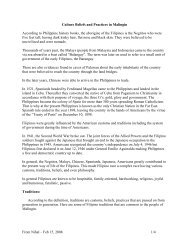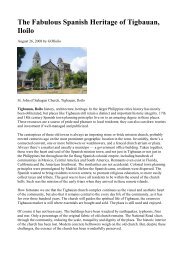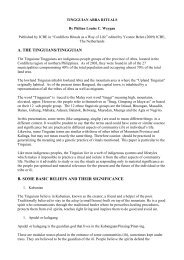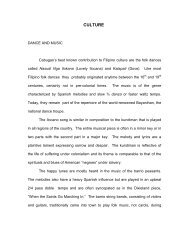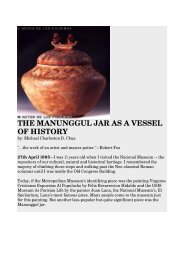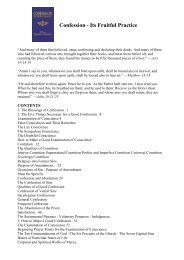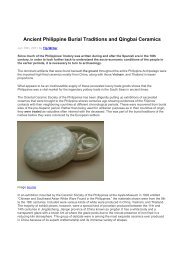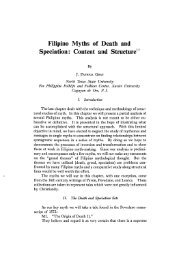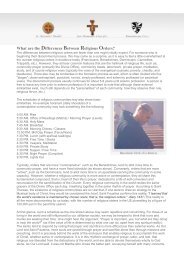Notes on Cebuano-Bisayan Ethnic Identity in the ... - AboutPhilippines
Notes on Cebuano-Bisayan Ethnic Identity in the ... - AboutPhilippines
Notes on Cebuano-Bisayan Ethnic Identity in the ... - AboutPhilippines
You also want an ePaper? Increase the reach of your titles
YUMPU automatically turns print PDFs into web optimized ePapers that Google loves.
Kobari/<str<strong>on</strong>g>Notes</str<strong>on</strong>g> <strong>on</strong> <strong>Cebuano</strong><strong>Bisayan</strong> <strong>Ethnic</strong> Indentity<br />
<strong>the</strong>ir regi<strong>on</strong>al networks and ethnic differences were <strong>in</strong>terpreted <strong>in</strong> <strong>the</strong>ir locality. Then, <strong>the</strong><br />
country faced <strong>the</strong> periods of col<strong>on</strong>izati<strong>on</strong> by Spaniards, Americans, and Japanese for<br />
hundreds of years. F<strong>in</strong>ally <strong>the</strong> Philipp<strong>in</strong>es became <strong>in</strong>dependent after WWII with some<br />
sta<strong>in</strong>s of <strong>the</strong>se col<strong>on</strong>ial experiences <strong>in</strong> modern Philipp<strong>in</strong>e society.<br />
Under <strong>the</strong> societal structure of col<strong>on</strong>izati<strong>on</strong>, <strong>the</strong> bipolar relati<strong>on</strong>,<br />
“col<strong>on</strong>izer”“col<strong>on</strong>ized”, was c<strong>on</strong>structed am<strong>on</strong>g people’s c<strong>on</strong>sciousness with “we” as <strong>the</strong><br />
“col<strong>on</strong>ized” and “o<strong>the</strong>rs” as <strong>the</strong> “col<strong>on</strong>izer”.<br />
With <strong>the</strong> growth of a nati<strong>on</strong>al<br />
c<strong>on</strong>sciousness, <strong>the</strong> term, Filip<strong>in</strong>o 1 , ga<strong>in</strong>ed <strong>the</strong> recogniti<strong>on</strong> of what it means today. As to<br />
<strong>the</strong> process of collecti<strong>on</strong> of ethnic tribes <strong>in</strong> Philipp<strong>in</strong>e history, G<strong>on</strong>zalez (1991) briefly<br />
expla<strong>in</strong>s as follows;<br />
In <strong>the</strong> n<strong>in</strong>eteenth century, it was <strong>the</strong> Spaniards; <strong>in</strong> <strong>the</strong> twentieth, oppositi<strong>on</strong> was<br />
effectively dispersed through <strong>the</strong> political process <strong>in</strong> <strong>the</strong> lobby for <strong>the</strong><br />
<strong>in</strong>dependence under <strong>the</strong> American col<strong>on</strong>ial government; between 194145, it was<br />
aga<strong>in</strong>st <strong>the</strong> Japanese; <strong>in</strong> <strong>the</strong> brief moment of EDSA <strong>on</strong> February 2225, 1986, it<br />
was aga<strong>in</strong>st twenty years of misrule and dictatorship under Marcos.<br />
As <strong>in</strong> <strong>the</strong> case above, it is noted that <strong>the</strong> “we”“o<strong>the</strong>rs” dichotomy is str<strong>on</strong>gly felt<br />
especially <strong>in</strong> moments of crisis. A sense of nati<strong>on</strong>alism am<strong>on</strong>g <strong>the</strong> people of <strong>the</strong><br />
Philipp<strong>in</strong>es <strong>in</strong> <strong>the</strong> late n<strong>in</strong>eteenth century gave rise to <strong>the</strong>ir massive movements for<br />
freedom and <strong>the</strong> Americans supported <strong>the</strong>m for <strong>in</strong>dependence from <strong>the</strong> Spanish col<strong>on</strong>ial<br />
rule. As a result, <strong>the</strong> United States took over <strong>the</strong> c<strong>on</strong>trol of <strong>the</strong> Philipp<strong>in</strong>es through mass<br />
educati<strong>on</strong> whereas <strong>the</strong> Spaniards ma<strong>in</strong>ly used religi<strong>on</strong> (Christianity) as <strong>the</strong> channel for <strong>the</strong><br />
management of col<strong>on</strong>y.<br />
The primary purpose of mass educati<strong>on</strong> was to “civilize” Filip<strong>in</strong>os with English<br />
as a medium of <strong>in</strong>structi<strong>on</strong>. It is clear that <strong>the</strong> use of English was <strong>on</strong>e of <strong>the</strong> strategies of<br />
American col<strong>on</strong>ial rul<strong>in</strong>g system, but Filip<strong>in</strong>os <strong>in</strong> a sense accepted this mass educati<strong>on</strong>al<br />
system positively, because <strong>the</strong>y felt that <strong>the</strong>y could have an access to <strong>on</strong>e of <strong>the</strong> advanced<br />
modern educati<strong>on</strong>al opportunities even <strong>in</strong> barrios. Therefore <strong>the</strong> system came to create<br />
subtle selfc<strong>on</strong>sciousness am<strong>on</strong>g Filip<strong>in</strong>os that “we”<br />
(Filip<strong>in</strong>os) were beh<strong>in</strong>d and “<strong>the</strong>y”<br />
(Americans) were advanced. But a sense of selfawareness for be<strong>in</strong>g Filip<strong>in</strong>os <strong>in</strong> relati<strong>on</strong><br />
<strong>the</strong> dichotomy of “we” (col<strong>on</strong>ized) and “o<strong>the</strong>rs” (col<strong>on</strong>izer) arose <strong>on</strong>ce aga<strong>in</strong> and led<br />
Filip<strong>in</strong>os to centripetal forces to unite <strong>the</strong>mselves under <strong>the</strong> American col<strong>on</strong>ial rule. After<br />
<strong>the</strong> similar movements of Filip<strong>in</strong>o’s unificati<strong>on</strong> dur<strong>in</strong>g <strong>the</strong> Japanese occupati<strong>on</strong> period and<br />
WWII, <strong>the</strong> Philipp<strong>in</strong>es f<strong>in</strong>ally became an <strong>in</strong>dependent nati<strong>on</strong> sate <strong>in</strong> 1946.<br />
However, <strong>on</strong>ce <strong>the</strong>se crises were over, Filip<strong>in</strong>os lost <strong>the</strong> overt presence of<br />
“o<strong>the</strong>rs” (col<strong>on</strong>izers) to which <strong>the</strong>y obta<strong>in</strong>ed a sense of selfawareness as Filip<strong>in</strong>os <strong>in</strong><br />
c<strong>on</strong>trast. Tagalogs <strong>in</strong> Manila tool over <strong>the</strong> col<strong>on</strong>ial predom<strong>in</strong>ance <strong>in</strong> every social,<br />
9 th Philipp<strong>in</strong>e L<strong>in</strong>guistics C<strong>on</strong>gress (2527 January 2006)<br />
Organized by <strong>the</strong> Department of L<strong>in</strong>guistics, University of <strong>the</strong> Philipp<strong>in</strong>es<br />
4



